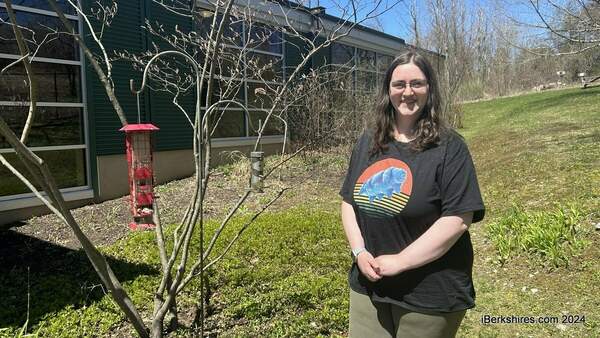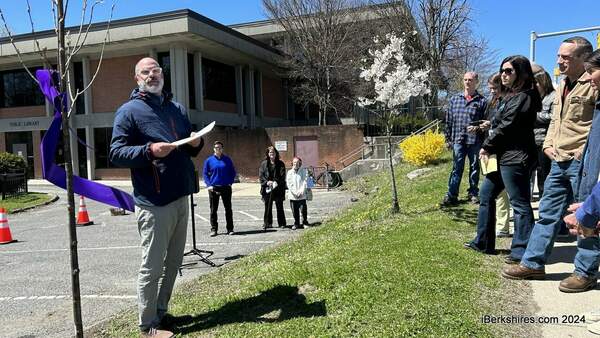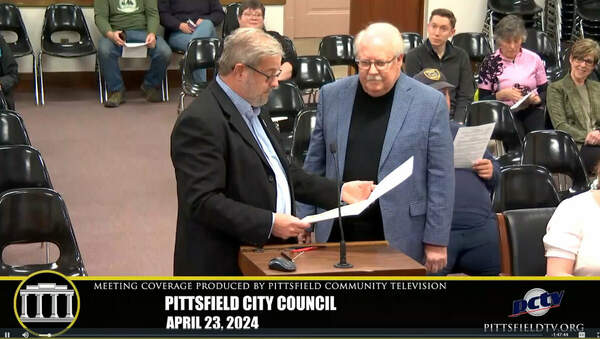Mosquito Control Talk Resumes at Pittsfield Board of Health
PITTSFIELD, Mass. — You know it's spring when talk turns to mosquito control in Pittsfield.
The Board of Health last Wednesday received a presentation from the Berkshire County Mosquito Control Project with a recommendation for a full program that includes adult mosquito control or spraying.
The panel has until May to make a decision on the program. It will then return to the City Council, which hasn't been supportive of mosquito spraying in the past.
In April 2021, the subcommittee on Public Health and Safety voted to opt out of the spraying portion of BCMCP followed by an approval by the City Council later that month.
The Board of Health pushed back against the council's decision in September after an onslaught of the insects over the summer caused by heavy rainfall, asking the subcommittee to reconsider.
Instead, the subcommittee voted to opt out of BCMCP as a whole in October. Later that month, the City Council grappled with the idea and referred the matter to the Conservation Commission, the Health Department, and Commissioner of Public Services and Utilities Ricardo Morales.
The city never opted out of the program as a whole, but the mosquito spraying portion was discontinued. Pre-emptive larval control and catch basin operations remained.
Even though the council has opted out of spraying, the state can still mandate mosquito spraying under circumstances such as an outbreak of eastern equine encephalitis, sometimes referred to as triple E. Under MGL Chapter 252 Section 2-A, the State Board has the authority to spray once the Department of Public Health has determined that there's an elevated risk of larva virus for that year.
There were no isolations of West Nile virus or eastern equine encephalitis last year.
"We did meet with Conservation Commission who sent support for our water management work and this is our annual review with a comprehensive plan and I don't have changes to the plan," the project's Superintendent Chris Horton said.
"I think the plan is solid, the last thing the last major change we made was to address river flooding and bridge factor species, those are the eastern equine species that are seasonal in nature and I mean, we had already gotten through that process that would have been implemented last summer if we had been able to move forward with adult control."
The project uses "integrated mosquito management" in Berkshire County to control the insects. Horton said it is knowledge-based, resource-driven, and uses adaptive management.
"Adaptive management is basically a process where you can eliminate variables in real-time as you're moving forward," he said.
"So as conditions change, we make decisions based on past experience, based on data we've collected and it's a more or less a structured process to get the best result."
The main principles of IMM are community engagement, mapping surveillance thresholds, source reduction larval control adult control, and monitoring efficiency and resistance.
Source reduction involves monitoring the breeding source of mosquitos, which is stagnant water. This includes natural wetlands and manmade containers.
As a part of this, the mosquito project maintains drainage structures such as stormwater outflows to make sure they are not clogged. The project is also involved in beaver management.
For adult control, Horton proposes the use of truck-based, ultra-low volume pesticide application from city roads. He said that adult control is used to reduce species abundance and reduce viral amplification.
The city's Code Red alert system has previously been used to notify residents of spraying times.
Adult control is a major issue, the superintendent said, because there is no substitute for adult control and the city can't rapidly reduce the adult population with any other method.
Horton also spoke to the concern that has been generated about the pesticide products that are used.
"[The products] are a huge concern, we're the only entity that uses pesticides over the general public so everybody is very careful about what we use and how we use, so we use only (U.S Environmental Protection Agency) registered products, the product is registered by the EPA, there's a whole process in place under the federal Insecticide, Fungicide, and Rodenticide Act, it's an act of Congress that ensures regulation of pesticides to one make sure that they work and that they don't cause harm to the human population or the environment," he explained.
"So all of our products are registered by the EPA so that says they work and when we use them according to label instructions we have to follow by law, the EPA is stating that they aren't a risk to humans or the environment.
"In addition to the EPA, the product is also approved by Massachusetts state Pesticide Bureau, all products and that proved in the state of Massachusetts if a product has risks that are not accepted by the state, it wouldn't be approved for use in the state and then we have endangered species laws that we work with Massachusetts Fish and Wildlife to ensure that any of our applications aren't affecting endangered species or sensitive habitats in the state."
Horton later added that some of the resistance to adult spraying came from a situation when a substance was found in the plastic pesticide containers that is resistant to oil and had been found in trace amounts in the product.
He said that has been more or less resolved because the product comes in untreated containers.
A recommendation was made to strongly suggest another presentation on the program to the public health subcommittee or to the council.
Tags: mosquito spraying,















